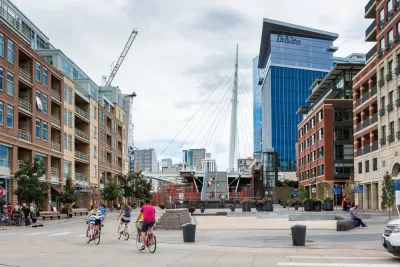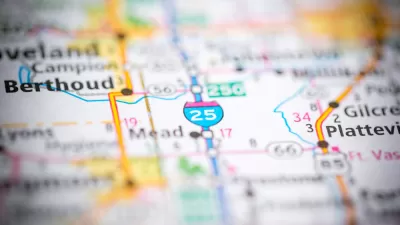A proposed transportation strategy could shift the state’s focus away from driving and toward incentivizing public transit use, walking, and biking.

“After decades of pouring billions of dollars into a transportation system that favors moving vehicles quickly above all else, the Denver region could see a significant funding shift away from road expansions and toward public transit, pedestrian and bicycle infrastructure” if a proposal before the board of the Denver Regional Council of Governments (DRCOG) passes, reports Nathaniel Minor for Colorado Public Radio.
The new plan would ax planned expansions of Interstate 25 and C-470 and cut or minimize similar widenings on smaller roads across the region. It would also move $900 million away from road expansions to fund climate-friendly transportation projects, including projects that would overhaul busy streets to help public buses move faster.
To reduce emissions, Colorado is planning for a shift to electric vehicles and renewable energy. “State officials and climate-minded legislators, urged along by clean transportation experts, are also trying to incentivize Coloradans to drive less by making buses, trains, walking and cycling safer and more convenient — and cutting highway expansions that would likely have attracted more drivers.”
The proposal calls for speeding up five bus rapid transit (BRT) projects, with a new completion date of 2030. These include “East Colfax in Denver and Aurora; East Colfax Extension between I-225 and E-470; Federal Boulevard; Colorado Boulevard; and State Highway 119 between Boulder and Longmont.”
The plan doesn’t eliminate all highway expansions, retaining plans for new toll lanes on Interstate 270, Interstate 25, and Interstate 70, as well as roughly a dozen arterial street expansions.
FULL STORY: Metro Denver set to drop I-25 and C-470 expansions as planners shape climate-minded transportation future

Alabama: Trump Terminates Settlements for Black Communities Harmed By Raw Sewage
Trump deemed the landmark civil rights agreement “illegal DEI and environmental justice policy.”

Planetizen Federal Action Tracker
A weekly monitor of how Trump’s orders and actions are impacting planners and planning in America.

The 120 Year Old Tiny Home Villages That Sheltered San Francisco’s Earthquake Refugees
More than a century ago, San Francisco mobilized to house thousands of residents displaced by the 1906 earthquake. Could their strategy offer a model for the present?

Opinion: California’s SB 79 Would Improve Housing Affordability and Transit Access
A proposed bill would legalize transit-oriented development statewide.

Record Temperatures Prompt Push for Environmental Justice Bills
Nevada legislators are proposing laws that would mandate heat mitigation measures to protect residents from the impacts of extreme heat.

Downtown Pittsburgh Set to Gain 1,300 New Housing Units
Pittsburgh’s office buildings, many of which date back to the early 20th century, are prime candidates for conversion to housing.
Urban Design for Planners 1: Software Tools
This six-course series explores essential urban design concepts using open source software and equips planners with the tools they need to participate fully in the urban design process.
Planning for Universal Design
Learn the tools for implementing Universal Design in planning regulations.
Clanton & Associates, Inc.
Jessamine County Fiscal Court
Institute for Housing and Urban Development Studies (IHS)
City of Grandview
Harvard GSD Executive Education
Toledo-Lucas County Plan Commissions
Salt Lake City
NYU Wagner Graduate School of Public Service





























